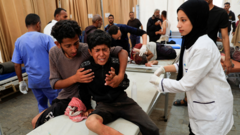Recent Israeli gunfire near a humanitarian aid site in Gaza has resulted in the deaths of over 51 Palestinians and injured more than 200 others. The violence, which coincides with attempts to distribute food to desperate families, highlights a dire humanitarian situation exacerbated by military actions.
Humanitarian Crisis Deepens as Israeli Forces Target Aid Seekers in Gaza, Leaving 51 Dead

Humanitarian Crisis Deepens as Israeli Forces Target Aid Seekers in Gaza, Leaving 51 Dead
A tragic attack near an aid distribution site in Khan Younis underscores the increasing peril faced by Palestinians in Gaza as they seek vital food supplies amidst ongoing violence.
Israeli forces have reportedly killed over 51 Palestinians and injured many more during a tragic incident at an aid distribution site in southern Gaza, according to witnesses and rescuers. This deadly shooting occurred in Khan Younis as crowds gathered, hopeful for flour distributed by the World Food Programme (WFP), and follows a disturbing pattern of violence surrounding aid delivery across the region.
According to the Hamas-run civil defense agency, Israeli troops opened fire amidst large gatherings, leading to chaos and numerous casualties. As more than 200 individuals sustained injuries, the Israeli military stated they are investigating the claims. Eyewitness accounts reveal that the violence escalated as drones launched missiles, followed by tank shells fired from approximately 400 to 500 meters away, causing widespread panic and devastation among desperate residents.
Nasser Hospital, the primary medical facility operating in the area, has been overwhelmed. Medical staff report a harrowing scene with numerous wounded being treated in overcrowded conditions due to the constant influx of casualties from these ongoing aid-related incidents. "This is again the result of another food distribution initiative," remarked Thanos Gargavanis, a trauma surgeon with the World Health Organization (WHO), emphasizing the alarming trend of food distribution sites coinciding with increasing mass casualty incidents.
In recent weeks, medical personnel have repeatedly warned of the hospital's inability to cope under extreme pressure, compounded by limited medical supplies and ongoing Israeli evacuation orders. The situation escalated as more incidents of violence have occurred near aid distribution sites operated by the Gaza Humanitarian Foundation (GHF), which has been receiving support from both Israel and the United States.
The Israeli Defense Forces (IDF) claimed that their troops issued warnings when crowds approached areas they were monitoring. However, the absence of independent verification raises concerns about accountability and transparency amid conflicting reports of threats posed by local armed groups.
With Israel imposing restrictions on international media in Gaza, the ability to verify events on the ground remains profoundly limited. Observers have noted that the desperate circumstances compelling thousands of Palestinians to gather for assistance are a direct result of the restrictions and operational challenges affecting humanitarian aid delivery.
The GHF has distanced itself from the violence occurring at its sites, asserting that such incidents are outside their purview. This stance has done little to quell rising fears among communities that these distribution hubs have inadvertently become perilous zones.
Moreover, as reports emerge of increased looting and criminal elements exploiting the already precarious situation among the population, the humanitarian crisis continues to intensify, deepening fears of systemic collapse.
UN officials have condemned Israel's actions as tantamount to weaponizing food, calling for urgent investigations into the violence. As the death toll mounts—over 55,297 Palestinians have reportedly been killed since the escalation of conflict in Gaza—questions about the safety of humanitarian access and the adequacy of international responses linger without resolution. The unfolding tragedy highlights the urgent need for dialogue and actionable solutions among the international community to safeguard lives while delivering essential aid to those in desperate need.



















